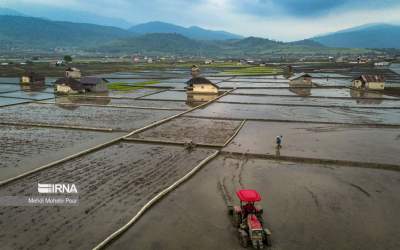Saturday 30 May 2020 - 17:13
Story Code : 376793
Crisis in the Caspian Sea: The world's largest lake drying up?
5.5 million years have passed since the emergence of the Caspian Sea in northern Iran. During this time, the sea has been repeatedly on the verge of drying up due to natural causes; now, some researchers are warning that the sea is once again running the risk of drying up. But this time, instead of nature, humans are the actual culprits.
The Water Research Institute at the Iranian Center for Caspian Sea Studies and Research has said in a report that the water level of the Caspian Sea in 2019, following its declining trend since 1995, has reached its lowest level in 30 years: dropping to -27.18 meters, which shows a 13 centimeters decrease compared to 2018.
In fact, this decrease in the level of water in Iran�s northern sea is not only related to the last year but rather, the declining trend has been going on for the last 25 years.
Statistics and drought in northern wetlands warn of crisis in the Caspian Sea
Deputy of Marine Environment at the Iranian Department of Environment, Ahmadreza Lahijanzadeh, said in this regard, �The level of the Caspian Sea in the last hundreds of years hit its lowest in 1979, and its highest in 1995. After that, from 1995 to 2010, the observed trend for the sea was almost constant, and after 2010, we are witnessing a decreasing trend in the sea�s level.�
According to a study published in the Geographical Journal in the US in the summer of 2017, the Caspian Sea level had rapidly declined from 1996 to 2015. Before that, the sea level was on an increasing trend.
These changes, which have taken place in recent years, have also had consequences for the environment. Previously, it was thought that the changes would allow more light to reach the depths of the sea and improve its ecological condition.
The deputy of the Iranian Department of Environment, however, bears bad news.
�The latest results from studies carried out by Russian researchers and Iranian universities show that during this time, the process of the improvement of the Caspian Sea�s ecological situation has slowed down as oxygen consumption has increased. Also, with the retreat of the Caspian Sea, we will lose some of our inland wetlands, the evidence of which we have already seen in Anzali, Gomishan, Miankaneh, etc.�
The Caspian Sea, 3,000 years away from drying up
But these are not the only consequences of the decrease in the level of the world's largest lake. Some researchers have warned that as this trend continues, there is a possibility that the Caspian Sea will dry up in the distant future.
A 2018 study published in Nature scientific journal by a group of NASA researchers described the conditions of the Caspian Sea as follows: �Due to direct water abstraction from rivers feeding the Caspian Sea, the sea is now in a similar condition as the Aral Sea (an endorheic lake between Kazakhstan and Uzbekistan that dried up due to human activities). The Caspian Sea has 78,000 gigatons of water and will survive for another 3,000 years if the decent continues, although there is still a risk of the sea retreating.�
In an interview published on sciencealert.com, this team of researchers had warned that under current climate models, the evaporation could even see the northern waters of the Caspian vanish within 75 years.
Lahijanzadeh, however, is opposed to these definite predictions: �Caspian Sea experts are reluctant to predict the sea�s level for more than a year, as precipitation may suddenly double in one year. Yes, we can say in simple and layman terms that with the continuation of that decent, the Caspian Sea will eventually dry up, but it is not possible to use these definite predictions and arguments for nature."
Researchers from the Vrije Universiteit Amsterdam have published various scenarios for the Caspian Sea level up to 2100, which predict that under average conditions, the Caspian Sea level will drop by 9 meters by the end of the century.
According to this, if this prediction were to come true, a historic event should have taken place in the Caspian Sea, because in the last thousand years, the Caspian Sea level has never reached below minus 35 meters.
Of course, some experts do not see this trend as worrying. Abbas Gholi Jahani, a former member of the World Water Council, said in an interview that �What happened to Urmia Lake will not happen to the Caspian Sea, but there will be a retreat, which is part of the natural fluctuations.�
Agriculture; the main culprit behind the Caspian Sea crisis
Contrary to the natural increase and decrease of the Caspian Sea in the last millions of years, this time human factors had a role to play and this issue makes the situation in the Caspian Sea even more critical.
About this, Lahijanzadeh says: �The level of the Caspian Sea depends on a number of factors, the first and most important of which is the hydraulic regime, and by that, I mostly mean the Volga River, which flows through central Russia into the Caspian Sea and feeds 240 to 260 billion cubic meters of water into the sea from the northern Mediterranean Sea."
�An increase in the water abstraction from the Volga River for agriculture is one of the reasons for the drop in the Caspian Sea water level,� he says.
About�80 percent�of the water flowing into the�Caspian�Sea comes from the�Volga River, and now, too much water abstraction from the river has left a direct effect on the reduction of the Caspian Sea�s level. Volga, which is also Europe's largest river, runs through 20 major Russian cities, including Moscow, and there are 11 dams built along this path; therefore, the amount of water extracted from the river has increased year by year since the end of the last century, and this has caused the level of the Caspian Sea to decrease.
The study published in Nature journal also states that the impact of this water consumption amounts to a 60% share of the decline in the Caspian Sea water level. "In response to the question about what prevents more water from flowing from the Volga River into the Caspian Sea, two different factors can be noted: one is the reduction of rainfall and the other is too much water abstraction from the river for agricultural purposes.�
Also, in this study, evaporation and temperature increase have been named as the second most important factor in the reduction of the water level in the Caspian Sea (18%). The average temperature of the Caspian Sea in 2019 has increased by 0.2 degrees Celsius compared to 2018 and jumped by one degree compared to the long-term average.
Although this is not the main reason for the decline in the Caspian Sea level, it could play a more significant role in the future.
�Evaporation is one of the reasons for the decrease in the�sea level. The rise in temperature in the world has caused the average temperature in the Caspian Sea to increase between 0.7 and 1 degree Celsius, and as a result, the evaporation has increased,� Lahijanzadeh further explained.
# Tags










